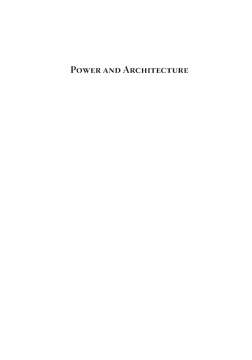
Additional Information
Book Details
Abstract
Capital cities have been the seat of political power and central stage for their state’s political conflicts and rituals throughout the ages. In the modern era, they provide symbols for and confer meaning to the state, thereby contributing to the “invention” of the nation. Capitals capture the imagination of natives, visitors and outsiders alike, yet also express the outcomes of power struggles within the political systems in which they operate. This volume addresses the reciprocal relationships between identity, regime formation, urban planning, and public architecture in the Western world. It examines the role of urban design and architecture in expressing (or hiding) ideological beliefs and political agenda. Case studies include “old” capitals such as Rome, Vienna, Berlin and Warsaw; “new” ones such as Washington DC, Ottawa, Canberra, Ankara, Bonn, and Brasília; and the “European” capital Brussels. Each case reflects the authors’ different disciplinary backgrounds in architecture, history, political science, and urban studies, demonstrating the value of an interdisciplinary approach to studying cities.
Michael Minkenberg is Professor of Comparative Politics at the European University Viadrina in Frankfurt (Oder). From 2007-2010, he held the Max Weber Chair for German and European Studies at NYU. He has also taught at the Universities of Göttingen and Heidelberg, and at Cornell and Columbia Universities. Minkenberg is author of The Radical Right in Europe. An Overview (2008) and co-editor of Turkish Membership in the European Union – the Role of Religion, a special issue of Comparative European Politics (2012).
“…a volume which, through its innovative approach, provides numerous valuable insights.” · Contemporary European Studies
“This collection of provocative urban histories makes an important contribution to the interdisciplinary discourse on power and architecture defined by national political regimes. These studies reveal how architecture exercises social control not just through its material reality, but also, and perhaps more subtly, as a discursive framework that shapes cultural narratives and social identities.” · Power and Architecture
“…a confidence in the power of architecture as a progressive force is palpable at many points in this fascinating collection of papers. With nearly a hundred photographs, maps or illustrations, this book has been lovingly produced, and it confirms Nietzsche’s thesis that there is a close link between architecture and the search for knowledge.” · Journal of European Studies
“…a fascinating topic for architects, urban designers and urban master planners…the interaction of political power, political-philosophical ideas about the state, and built form...The contributors are clearly experts on their topics, and no single author could ever have handled the [subject matter] with this combination of breadth and depth.” · Sir Peter Hall, University College London
